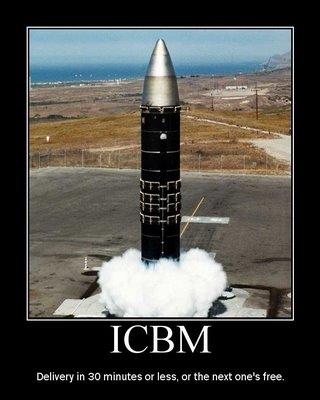Does everyone here agree that the US is in the habit of keeping "stooges?"
I would not normally term them such, but the US certainly has many client-states, some under more direct control than others.
Pardon me Baal, but was it necessary to say it this way and imply that someone in the thread thought it might?
I implied nothing. I said that Saddam being a US stooge did not excuse his actions. I made absolutely no claims whatsoever about the thoughts of people in this thread.
Sorry I do not understand this.
If one thing is rationalization by something and another thing is rationalised by the something but wrongly, why is the first rationalization wrong.
It's not.
How can the same rationalization be "wrong" in one instance but not in another quite similar one? Either you think the US should have intervened militarily to stop the supposed spread of communism, or you don't.
Contextually different circumstances.
South Korea was invaded in 1950, very shortly after the Soviet withdrawal from North Korea. Both North and South Korea were newly independent states, their independence won for them by outsiders after decades of Japanese rule. The Japanese were very effective at stamping out resistance, to the point that there were very few politically-experienced individuals in Korea that weren't collaborators.
Mainland China had just fallen to the communists after a bloody civil war and the USSR had been systematically establishing control over various puppet-regimes in eastern Europe. Both France and Italy had large communist parties with very realistic chances at gaining political power and even the British Labor Party was on very friendly economic terms with the USSR. The latter had been chased out of Iran very unwillingly after WWII and was still interfering there, as well as in Greek and Turkish politics, as well as supporting communist revolutionary movements abroad. The Marshal Plan had yet to transform Europe and the Japanese socialist and communist parties were gaining electoral success.
In this context, the invasion of South Korea appeared to be yet another step towards creating a communist bloc across the Eurasian continent. Incidentally, the US was well-aware of Stalin's discussions with Hitler regarding a Eurasian bloc during WWII.
Fast-forward to Vietnam. The USSR and PRC are at each other's throats more than they are at the West's. France and Italy, while still having a communist underground, are firmly-entrenched in the West. Japan has been rehabilitated and is under the control of a communist-fearing, pro-Western government which relies on American support, as has West Germany. The establishment of NATO acts as a bulwark against further Soviet expansion. No country besides Cuba, which was a local phenomenon, has 'gone communist' since the PRC defeated the
guomindang in 1949. The Soviets have instead been forced to use military force to maintain their grip on what they already have.
Stalin is dead. His successor, Krushchev, is much friendlier with the West and has floated the idea of a joint US-USSR attack on China to prevent the latter acquiring nuclear weapons. Vietnam has nowhere near the strategic importance of Korea, which was described as "a dagger pointing at Japan's heart." The USSR has begun to form a bloc to counter China and the West, courting India and Egypt in the process, two distinctly non-communist states. The former is a democracy. The Vietnamese have fought a bloody revolution against the French for more than a decade, culminating in a humiliating defeat for the French. While Ho Chi Minh is on relatively friendly terms with the Chinese, the rest of the Vietnamese leadership is very mistrustful with the PRC. Ho has shown a willingness to mediate issues in international arenas.
These two situations are entirely different. Literally the only similarities are that they both involve divided states, the northern state is communist and the southern a more traditional dictatorship, and both are in Asia. One might as well say that because the post-WWI Allied invasions of Russia and the 1941 German invasion of the USSR were both rationalised as preventing the spread of communism that the two situations are either both right or both wrong. For someone who denounces George W. Bush, you seem to practice his absolutism and use of false dichotomies an awful lot.




